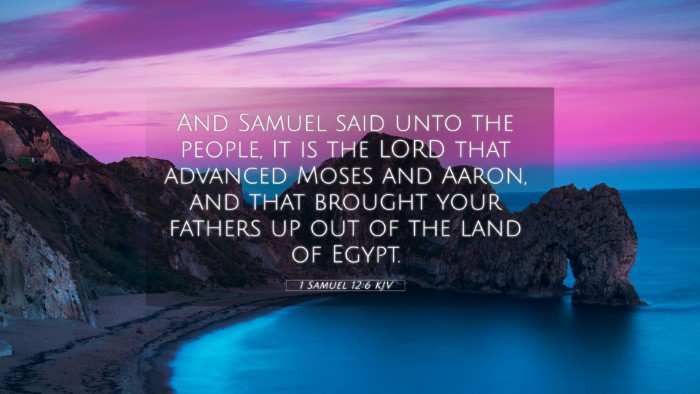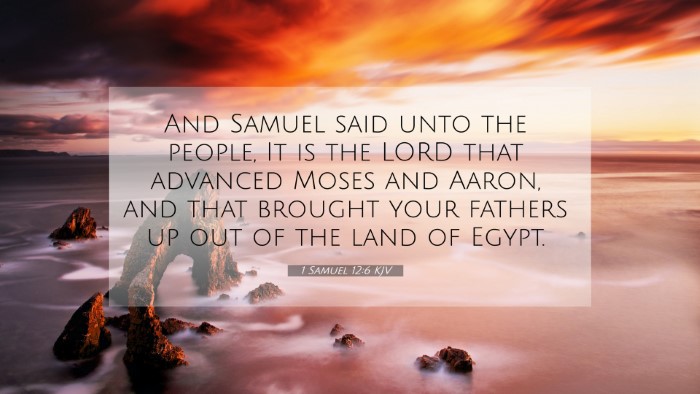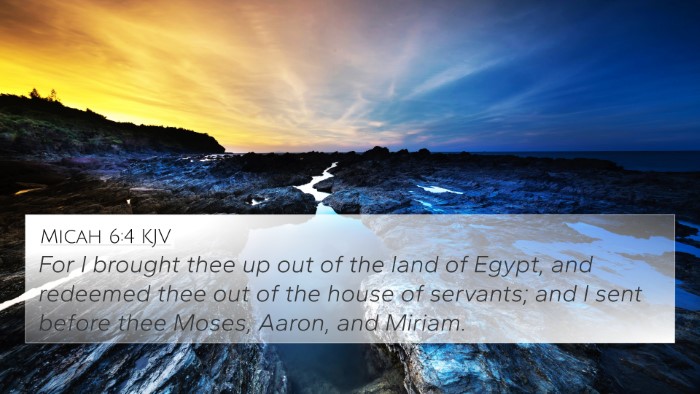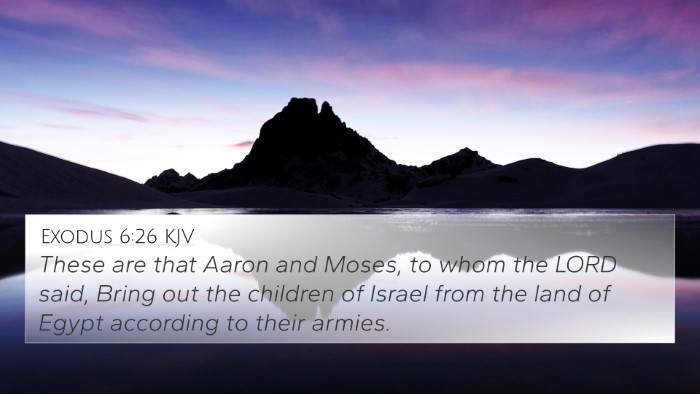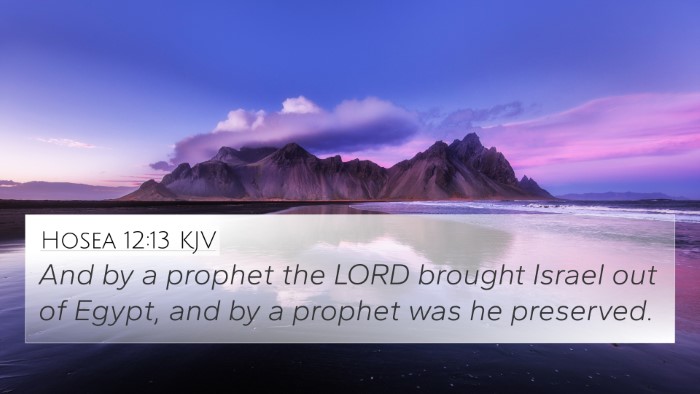Understanding 1 Samuel 12:6
In 1 Samuel 12:6, the prophet Samuel speaks to the Israelites, affirming the sovereignty of God over their history and leadership. This verse captures a moment where Samuel reminds the people of God's mighty acts, emphasizing His role in guiding and delivering Israel. The context surrounding this passage sheds light on key themes such as divine authority, the importance of obedience, and the consequences of human leadership choices.
Verse Meaning and Insights
Commentators like Matthew Henry highlight that Samuel's declaration serves to reaffirm God's rightful claim as the ruler over Israel. The historical context of the verse illustrates the transition from theocratic rule under God to a monarchy with King Saul. Henry notes that this transition was laden with implications for Israel’s identity and relationship with God.
Albert Barnes emphasizes the importance of acknowledging God's past interventions as a means to foster faith and obedience among the Israelites. He considers this verse a reminder that God has been the true leader, and the Israelites' decision to seek a king was a rejection of God's direct governance. This perspective invites readers to reflect on moments where they might have sought human solutions instead of divine guidance.
Adam Clarke adds that Samuel’s recollection of God’s actions highlights the themes of divine justice and mercy. He points out that the history recounted here serves a dual purpose: to provoke gratitude among the people and to warn them of the repercussions of their choices if they stray from following God. Clarke suggests that such reminders in Scripture function to keep believers grounded in their faith.
Connections to Other Scriptures
1 Samuel 12:6 finds thematic resonance in various other Biblical passages, creating a rich tapestry of intertextual dialogue. Here are some related verses that provide further insights:
- Exodus 18:21-22 - The appointment of leaders under God's guidance parallels the call for wise leadership in Israel.
- Deuteronomy 17:14-15 - God's instructions regarding kingship provide foundational context for understanding the Israelites' desire for a king.
- Judges 2:16-18 - The cyclical pattern of sin and deliverance demonstrates God's ongoing role as Israel's true leader.
- 1 Chronicles 29:11-12 - Acknowledgment of God's sovereignty and ownership of all provides a backdrop to understand His reign.
- Psalms 75:7 - The assurance that God is the ultimate judge who lifts one up and brings down another speaks to His authority.
- Romans 13:1 - The New Testament affirmation of God's authority over earthly governance echoes the themes found in Samuel's warning.
- Hebrews 13:17 - The exhortation to obey leaders resonates with the understanding of leadership established in 1 Samuel.
- Matthew 23:10 - Jesus' teaching on leadership and authority reflects back on the pitfalls of human leadership noted in 1 Samuel 12.
- James 1:5 - Encouragement to seek divine wisdom aligns with the need for God's guidance in leadership decisions.
Cross-Referencing Biblical Texts
The analysis of 1 Samuel 12:6 incorporates various cross-referencing tools. For those studying this verse, using a Bible concordance can assist in identifying connections to other verses more deeply. A Bible cross-reference guide can also illuminate thematic links to help readers understand the broader implications within the Scripture.
Tools for Bible Cross-Referencing
Engaging in cross-reference Bible study methods enhances one’s understanding of Scripture. Here are some tips:
- Utilize a Bible reference resource to explore parallel verses.
- Experiment with a Bible chain references approach to trace themes.
- Consider comprehensive Bible cross-reference materials available online or in study guides.
- Practice how to find cross-references in the Bible to enrich personal study.
The Importance of Recognizing Divine Sovereignty
As this exploration unfolds, it becomes apparent that 1 Samuel 12:6 underscores a critical understanding within the biblical narrative: the sovereignty of God. The act of recalling God's past deeds is not merely historical; it's an invitation for contemporary believers to recognize God’s continuing authority over their lives. In times of stress or leadership challenges, this reminder serves to redirect focus back to divine rather than human leadership.
Conclusion
In summary, 1 Samuel 12:6 is a pivotal verse that encapsulates the concepts of divine authority and the reality of human choice. By understanding this verse within its historical context and through the lens of other scriptures, one can grasp the importance of recognizing God's hand in leadership as well as the need for ongoing obedience. Through tools of cross-referencing and comparative analysis, believers are better equipped to understand their faith and the guiding principles laid out in the Bible.

